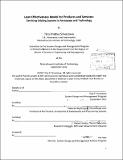| dc.contributor.advisor | Deborah Nightingale. | en_US |
| dc.contributor.author | Srivastava, Tina Prabha | en_US |
| dc.contributor.other | Massachusetts Institute of Technology. Engineering Systems Division. | en_US |
| dc.date.accessioned | 2013-07-10T14:52:31Z | |
| dc.date.available | 2013-07-10T14:52:31Z | |
| dc.date.copyright | 2012 | en_US |
| dc.date.issued | 2012 | en_US |
| dc.identifier.uri | http://hdl.handle.net/1721.1/79532 | |
| dc.description | Thesis (S.M.)--Massachusetts Institute of Technology, Engineering Systems Division, 2012. | en_US |
| dc.description | Cataloged from PDF version of thesis. | en_US |
| dc.description | Includes bibliographical references (p. 59-61). | en_US |
| dc.description.abstract | Enterprises undergo transformation for more efficient and effective performance and growth. The Lean Enterprise Self Assessment Tool (LESAT) is a product of the Lean Advancement Initiative (LAI) and the Massachusetts Institute of Technology (MIT). This tool is used by many enterprises to assess strengths, areas of improvement, and the enterprise's readiness to change. LESAT has been designed for enterprises that offer products only, not services. However, many of the principles and methodologies apply to servicing existing systems, which is a growing industry trend both in the private and public sector. Servicing existing systems accounts for 70% of the United States Department of Defense weapon system's total life-cycle cost. Many enterprises offer services to support, maintain, and upgrade their products. Many enterprises also rely on core internal systems that must be maintained and upgraded such as airline reservation systems or supply chain logistics tools. An extension of LESAT for Servicing Existing Systems is proposed as an assessment tool toward lean effectiveness for products and services. Collaborations with the International Council on Systems Engineering (INCOSE) In- Service Systems Working Group; three aerospace and technology enterprises Boeing, Pratt & Whitney, and Raytheon; as well as review of the literature are used in capturing best practices for success in servicing existing systems. | en_US |
| dc.description.statementofresponsibility | by Tina Prabha Srivastava. | en_US |
| dc.format.extent | 109 p. | en_US |
| dc.language.iso | eng | en_US |
| dc.publisher | Massachusetts Institute of Technology | en_US |
| dc.rights | M.I.T. theses are protected by
copyright. They may be viewed from this source for any purpose, but
reproduction or distribution in any format is prohibited without written
permission. See provided URL for inquiries about permission. | en_US |
| dc.rights.uri | http://dspace.mit.edu/handle/1721.1/7582 | en_US |
| dc.subject | Engineering Systems Division. | en_US |
| dc.title | Lean effectiveness model for products and services : servicing existing systems in aerospace and technology | en_US |
| dc.type | Thesis | en_US |
| dc.description.degree | S.M. | en_US |
| dc.contributor.department | Massachusetts Institute of Technology. Engineering Systems Division | |
| dc.identifier.oclc | 849904788 | en_US |
